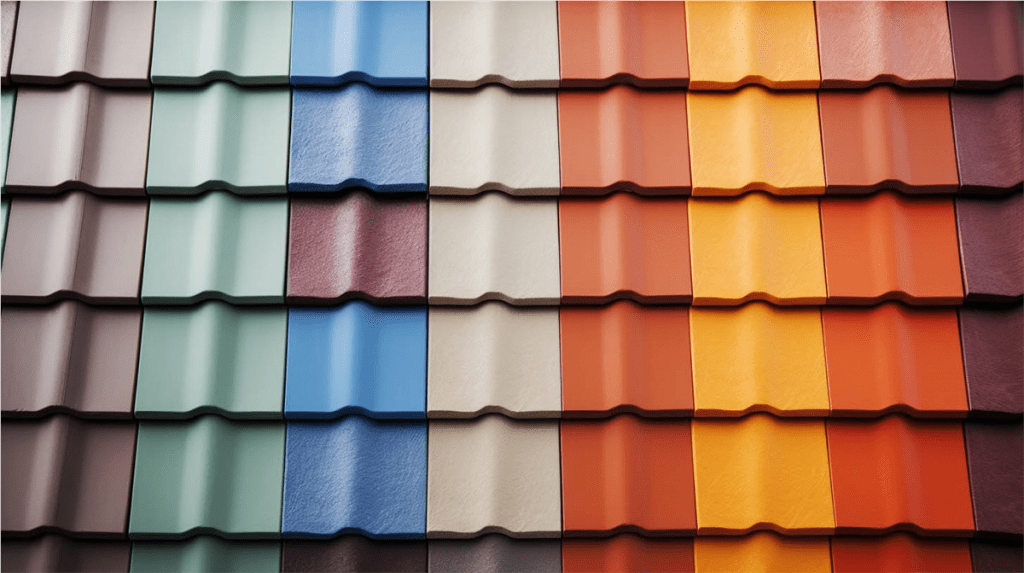When it comes to choosing the right roofing for your home, energy efficiency is a crucial factor. Not only can an energy-efficient roof save you money on energy bills, but it can also help reduce your carbon footprint. In this comprehensive guide, we will explore the Most Energy-Efficient Roof Material And Color, helping you make an informed decision for your next roofing project.

Understanding Energy Efficiency in Roofing
Before diving into the specifics of materials and colors, it’s essential to understand what makes a roof energy-efficient. Energy efficiency in roofing primarily revolves around the roof’s ability to reflect sunlight (solar reflectance) and emit absorbed heat (thermal emittance). Roofs with high solar reflectance and thermal emittance can significantly reduce cooling costs and improve indoor comfort.
Read too: Decoding Timelines: How Long Does It Take To Replace A Roof and What to Expect
Most Energy-Efficient Roof Material And Color
Energy-Efficient Roof Materials
There are several roofing materials known for their energy efficiency. Here are some of the top choices:
1. Cool Roof Shingles
Cool roof shingles are designed to reflect more sunlight and absorb less heat than standard shingles. They are available in a variety of materials, including asphalt, metal, and tiles. These shingles are often coated with special reflective granules that enhance their energy efficiency.
2. Metal Roofing
Metal roofs are highly reflective and emissive, making them an excellent choice for energy efficiency. They can reflect up to 70% of the sun’s energy, reducing cooling costs by up to 25%. Metal roofs are also durable, lightweight, and often made from recycled materials, adding to their eco-friendliness.
3. Tile Roofing
Tile roofs, especially those made of clay or concrete, are naturally reflective and can be coated with reflective materials to enhance their energy efficiency. These roofs can keep your home cooler in the summer and provide excellent insulation during the winter.
4. Green Roofs
Green roofs, or living roofs, are covered with vegetation. They provide excellent insulation, reduce heat absorption, and improve air quality. Green roofs can also reduce stormwater runoff and provide additional green space in urban environments.
5. Slate Roofing
Slate is a natural stone that offers excellent durability and energy efficiency. Slate roofs can last over a century and have high thermal emittance, making them an ideal choice for both hot and cold climates.
The Impact of Roof Color on Energy Efficiency
Color plays a significant role in the energy efficiency of a roof. Lighter colors tend to reflect more sunlight, reducing heat absorption, while darker colors absorb more heat, increasing cooling costs.
Light-Colored Roofs
Light-colored roofs, such as white, beige, and light gray, are highly reflective. These colors can reflect up to 80% of sunlight, significantly reducing heat absorption and cooling costs. Light-colored roofs are particularly beneficial in hot climates where cooling costs are a primary concern.
Dark-Colored Roofs
Dark-colored roofs, such as black, dark gray, and brown, absorb more heat, which can increase cooling costs. However, in colder climates, dark roofs can help reduce heating costs by absorbing and retaining heat. Dark roofs are often preferred for their aesthetic appeal, but advancements in reflective coatings have made it possible to have energy-efficient dark roofs as well.
Factors to Consider When Choosing the Most Energy-Efficient Roof Material And Color
1. Climate
Your local climate plays a crucial role in determining the best roofing material and color for energy efficiency. In hot climates, opt for materials and colors with high solar reflectance and thermal emittance. In colder climates, consider materials that provide good insulation and colors that can absorb and retain heat.
2. Roof Slope and Design
The slope and design of your roof can affect its energy efficiency. Steeper roofs tend to have better drainage and can accommodate a wider variety of materials. Flat or low-slope roofs may benefit more from highly reflective materials and coatings.
3. Local Building Codes and Regulations
Check local building codes and regulations before choosing a roofing material and color. Some areas may have specific requirements for energy-efficient roofing to promote sustainability and reduce energy consumption.
4. Aesthetic Preferences
While energy efficiency is essential, you should also consider the aesthetic appeal of your roof. Choose a material and color that complements your home’s architecture and enhances its curb appeal.
Benefits of Choosing the Most Energy-Efficient Roof Material And Color
1. Reduced Energy Bills
Energy-efficient roofs can significantly reduce your cooling and heating costs by reflecting more sunlight and providing better insulation. This can lead to substantial savings on your energy bills over time.
2. Increased Indoor Comfort
By reducing heat absorption and improving insulation, energy-efficient roofs can maintain a more consistent indoor temperature, enhancing your home’s comfort.
3. Environmental Impact
Choosing an energy-efficient roof helps reduce your carbon footprint by lowering energy consumption. This contributes to environmental sustainability and supports efforts to combat climate change.
4. Enhanced Durability
Many energy-efficient roofing materials, such as metal and slate, are known for their durability and longevity. This can result in fewer repairs and replacements, saving you money in the long run.
5. Potential for Rebates and Incentives
In some areas, installing an energy-efficient roof may qualify you for rebates and incentives from local or state governments. These programs are designed to encourage energy-efficient home improvements and can help offset the initial cost of your roofing project.
Conclusion
Choosing the Most Energy-Efficient Roof Material And Color involves considering various factors, including climate, roof design, and aesthetic preferences. By selecting the right combination of material and color, you can enjoy lower energy bills, increased indoor comfort, and a reduced environmental impact. Whether you opt for cool roof shingles, metal roofing, or a green roof, investing in an energy-efficient roof is a smart decision for both your wallet and the planet.



Leave a Reply